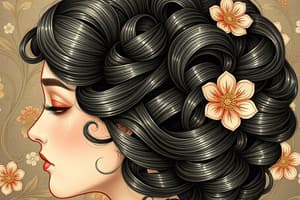Podcast
Questions and Answers
What is the name for a chemical service designed to change tightly curled hair to curly or wavy hair?
What is the name for a chemical service designed to change tightly curled hair to curly or wavy hair?
Curl Reforming
What is the main ingredient found in rearrangers used during a curl reformation process?
What is the main ingredient found in rearrangers used during a curl reformation process?
Ammonium Thioglycolate
During a curl reforming service, what size parting should be used?
During a curl reforming service, what size parting should be used?
Thinner than normal
When performing a curl reformation service, the rod diameter chosen is generally at least how many times larger than the diameter of the natural curl pattern?
When performing a curl reformation service, the rod diameter chosen is generally at least how many times larger than the diameter of the natural curl pattern?
All of the following chemical rearrangers are appropriately matched with the recommended hair type EXCEPT.
All of the following chemical rearrangers are appropriately matched with the recommended hair type EXCEPT.
What is the main ingredient found in a booster used during a curl reformation process?
What is the main ingredient found in a booster used during a curl reformation process?
Ammonium Thioglycolate is the main ingredient in?
Ammonium Thioglycolate is the main ingredient in?
What does rebounding refer to in a reformation curl service?
What does rebounding refer to in a reformation curl service?
Why should brushing the hair before any chemical service be avoided?
Why should brushing the hair before any chemical service be avoided?
A good predictor of how a client's hair will react to the chemical rearrangers, booster, and neutralizer is?
A good predictor of how a client's hair will react to the chemical rearrangers, booster, and neutralizer is?
Flashcards
Curl Reforming
Curl Reforming
A chemical service that loosens tightly curled hair, transforming it into looser curls or waves.
Ammonium Thioglycolate
Ammonium Thioglycolate
The primary active ingredient in rearrangers, responsible for softening and relaxing the existing curl pattern.
Parting Size During Curl Reforming
Parting Size During Curl Reforming
To ensure even penetration and consistent results, thinner partings are recommended.
Rod Diameter in Curl Reformation
Rod Diameter in Curl Reformation
Signup and view all the flashcards
Curl Reformation Booster
Curl Reformation Booster
Signup and view all the flashcards
Rebounding in Curl Reformation
Rebounding in Curl Reformation
Signup and view all the flashcards
Why Avoid Brushing Before Chemical Service?
Why Avoid Brushing Before Chemical Service?
Signup and view all the flashcards
Preliminary Strand Test
Preliminary Strand Test
Signup and view all the flashcards
Study Notes
Curl Reforming Overview
- Curl reforming is a chemical service aimed at transforming tightly curled hair into softer curly or wavy hair.
- Involves rearranging and neutralizing processes to achieve desired curl patterns.
Key Ingredients and Products
- Ammonium Thioglycolate: Main component in rearrangers used to reduce natural curl during curl reformation.
- Boosters: Mild, creamy forms of ammonium thioglycolate that initiate the formation of new curl patterns.
Techniques and Procedures
- Partings during a curl reforming service should be thinner than normal for effective application.
- The rod diameter used in the process should be at least two times larger than the natural curl diameter to ensure appropriate curl formation.
Hair Types and Chemical Product Compatibility
- Various chemical rearrangers are matched with specific hair types; however, certain products labeled "Super for fine hair" may not be suitable for all hair types.
Safety and Testing
- Brushing hair before chemical services should be avoided as it can prevent scalp irritations.
- A preliminary strand test is crucial to predict how a client's hair will react to the chemical products used in the curl reforming process.
Terminology
- Rebounding: Refers to the neutralizing phase, crucial for stabilizing the new curl structure after the application of rearrangers and boosters.
Studying That Suits You
Use AI to generate personalized quizzes and flashcards to suit your learning preferences.




